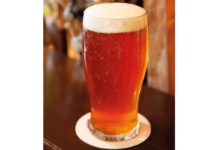Staff education vital in burgeoning category, producers say
It’s fair to say that craft beer has been one of the drinks industry’s biggest success stories of late.
Proof, if it was needed, of the sector’s health was highlighted in a new report by the Society of Independent Brewers, which claims four in five breweries expect to increase turnover this year, while one in six aims to double its turnover by 2018.
And there’s no shortage of breweries around.
As the category has gone from strength to strength, the number of craft brewers – and the range of beers they brew – has continued to climb.

With so many breweries producing so many beers there’s a lot for customers and bartenders to navigate.
And it’s in this landscape that Norman Sinclair of the Orkney Brewery reckons product knowledge is vital for publicans and bar staff to boost beer sales.
“Driving up sales for the publican starts with knowledge and awareness from the staff,” he said.
“Staff training and education is vitally important, not only for the existing ale customer but also the new ones too.
“If you have a guest ale on which matches with your special of the day then staff should be encouraged to make that connection and offer the customer that experience.
“Don’t just bury it [craft beer] at the back of the fridge and hope someone will see it. Orkney Brewery, for example, will do tent cards with tasting notes for the customers to view and get interest in the product.”
The importance of knowledge when it comes to craft beer was highlighted by Crawford Sinclair, director of sales for the UK and Ireland at Innis & Gunn.
Sinclair said all bar staff “should be equipped with the knowledge to describe the mouthfeel and body of the beer”.
“This might have sounded odd five to ten years ago, but we’ve noticed that customers are increasingly knowledgeable about beer and would love to be spoken to in terms that complement their knowledge and interest,” he said.
“The Cicerone Certification Program is the most well known and respected beer sommelier qualification and licensees would do well to get their staff trained up on it.
“It’s an investment that will pay dividends when customers notice that staff have a deep and nuanced understanding of the product they’re serving.”
While there’s always more to learn, Bobb Hogg, commercial director at Inveralmond Brewery, said he thinks bartender knowledge has improved as the craft beer sector has grown.
Publicans don’t need to go it alone when it comes to training, however, and Hogg suggested operators get in touch with brewers and take advantage of the resources available.
“Licensees and their staff can ask their suppliers for information and we encourage them to make use of back-of-clip profiles,” said Hogg.
“They can also ask suppliers for brewery tours to enhance their knowledge of products and indeed the whole category.
“Knowledge is key, and the more knowledge of the category, the more pubs and their staff will stand out and encourage repeat visits.”
Hosting ‘meet the brewer’ events is another way in which publicans can “enthuse their customers about the beer they pour by meeting the passionate people that make it”, said Hogg.
It’s one of a number of steps licensees can take to promote their craft beer offer to customers.
Crawford Sinclair at Innis & Gunn highlighted food and beer pairing events as another way operators can generate interest in the sector.
“Food and beer pairing [events] elevate the social positioning of beer,” he said.
“For many, beer is interchangeable, it’s something to be drunk in large quantities and not savoured and enjoyed for its taste. Craft beer flips this entirely and emphasises unique tastes, and innovation in brewing.
“Publicans looking to diversify their clientele and image would do well to invest in events that show off the breadth of what is possible with beer.”
Andrew Richardson of Black Wolf Brewery advised licensees to ensure they are aware of the craft breweries in their area and able to talk about what distinguishes different types of beer.
“Above all they [operators] should know what their customers want, what types and strengths of beers sell well, and stock them,” he said.
“The craft beer movement is part of a much bigger movement in food and drink as a whole, with consumers moving away from big, mass-produced brands towards products from smaller producers who offer greater choice and care more about quality. The trend is strong and will continue.”























